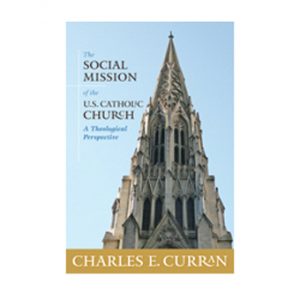By Charles E. Curran (Georgetown University Press, 2011)
 Catholic social teaching has been described as the church’s “best kept secret,” and 130 years after Pope Leo XIII published the church’s first social encyclical dealing with the rights of workers, Father Charles E. Curran argues that the U.S. Catholic Church has still not put the church’s social teachings and mission front and center, where they belong.
Catholic social teaching has been described as the church’s “best kept secret,” and 130 years after Pope Leo XIII published the church’s first social encyclical dealing with the rights of workers, Father Charles E. Curran argues that the U.S. Catholic Church has still not put the church’s social teachings and mission front and center, where they belong.
Before the Second Vatican Council, a largely immigrant American church sharply divided reality between our spiritual struggle for salvation and the much less important worldly struggle for survival or success, making it hard to see justice as an essential part of preaching the gospel. And while much of the official teaching on the centrality of the church’s social mission changed in the decades following the council, this new and decidedly biblical consciousness still has not sunk into the pulpit or pews. The church has, as Curran notes, an impressive body of teachings, but these new directions have not altered the course of the U.S. church.
To embrace and implement Catholic social teaching, Curran argues that clergy and laity must take up a new vision of the church as a unified and collaborative community committed to the full liberation of all persons and societies. We must also pay close attention to the social reality of our changing church and to the social challenges we face in this generation. We must understand and address the social, economic, and political challenges that confront all the people among whom we work and live. And we must take a long, hard look at the reality of the United States, examining and addressing the forces shaping this current age.
More than 2,500 years ago the prophets reminded Israel that there could be no righteous worship of God without justice toward the neighbor and stranger. Father Curran reminds us that any church that would call itself Catholic must first preach and practice justice.












Add comment